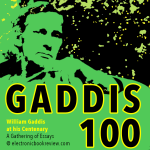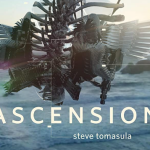fictions present
Gaddis-Knowledge After the “Very Small Audience” Era: Introduction to the Special Issue on “William Gaddis at his Centenary”

Ali Chetwynd's introduction to the Gaddis centenary gathering on ebr.
New Directions for Gaddis Scholarship

A talk given on October 20th 2022 at the William Gaddis Centenary Conference at Washington University St Louis. The version presented here is the talk as delivered, with minor edits only for clarity on the page and standardized grammar. Steven Moore prefers to leave the talk as a document of its original presentation, rather than changed into an academic article with the attendant scholarly apparatus of footnotes, works cited, and so on.
Futures of Gaddis Studies: Visions for the Next 100 Years

We asked our contributors a set of simple questions: what do you think Gaddis Studies has best covered already, what do you think are its prospects for the future, and what future avenues would you like to see explored?
Erroneous Assumptions: Steve Tomasula’s Ascension

Taking an ironic, Icarian twist on Steve Tomasula's Ascension, Stuart Moulthrop situates Tomasula's novel in a subterranean, encyclopedic lineage that includes print fictions like Joyce’s Ulysses, Dos Passos’ U.S.A. trilogy, Pynchon’s Gravity’s Rainbow, DeLillo’s Underworld, David Foster Wallace’s Infinite Jest, and Zadie Smith’s White Teeth – novels that are, as Edward Mendelson put it, “the products of an epoch in which the world's knowledge is larger than any one person can encompass.” It's an experimental lineage that is, arguably, one of the more noteworthy carryovers from print to digital literature; a genre that Moulthrop (2013) and his near contemporary Michael Joyce (2007) have termed the “novel of internet.”
Neocybernetic Posthumanism and the AI Imaginary: Artificial Communication in Kim Stanley Robinson’s Aurora

Bruce Clarke focuses transhumanism through the dialects of a neocybernetic systems theory (NST). As Clarke explores the dynamics of a NST, he outlines important components of the AI Imaginary—or, the theoretical and mediated discussions of intelligent technologies--in order to explore how machines, humans, and systems can work together. Specifically, he presents Kim Stanley Robinson’s novel Aurora (2015), as an exception to the AI Imaginary in its representation of “a solidarity that regathers rather than alienates human and machine beings.”